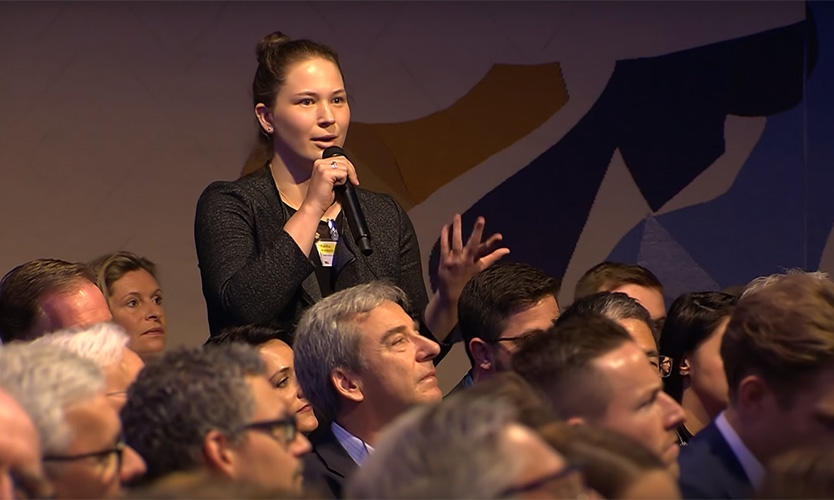NEWS
ICU Student Receives Recognition for Essay from the St. Gallen Symposium
Update: June 23, 2019
 Kastein asking Niall Ferguson a question during his lecture at the Symposium (Photo: St. Gallen Symposium)
Kastein asking Niall Ferguson a question during his lecture at the Symposium (Photo: St. Gallen Symposium)Kalika Kastein, an ICU master's student and Rotary Peace Fellow, wrote an essay titled "Rethinking Human Capital Within Displaced Populations," which stressed the need to change societal misconceptions of "refugees" and "economic migrants" and to instead recognize these groups for their positive contributions to the cultures and economies they enter. Her essay was one of 100 chosen from nearly 800 submitted essays for the Wings of Excellence Essay Contest, one of the most prestigious global essay contests aimed at graduate students. Kastein won a spot as a "Leader of Tomorrow," which enabled her to travel to St. Gallen in Switzerland and attend the conference from 8-10 May 2019 under a travel grant. Leaders of Tomorrow are selected as some of the most promising young talent under 30 from around the globe.

Research Theme:
Refugees, economic migrants, human capital, peace
Research Content:
Kastein's essay was inspired by the stories of her grandparents told her in her childhood about how they fled Estonia during Russian occupation to the United States, and how their work ethic and resourcefulness came from the difficult experiences they endured. Their stories impacted her views today on migration. Furthermore, the opportunity to take Professor Osamu Arakaki's course, "Refugee Law," at ICU also contributed to her paper's topic and content.
Today, instead of viewing the needs of those fleeing violence and oppression as legitimate, some politicians have attempted to make it harder for individuals, families, and children to seek protection in a new nation. Kastein's essay suggests that in response, what is needed is not tougher immigration policy or taller walls at borders, but rather, addressing the economic needs of those fleeing goes hand in hand with creating stability, building peace, and combatting extremism.
You can read Kastein's essay here: https://medium.com/essays-from-the-leaders-of-tomorrow/rethinking-human-capital-within-displaced-populations-a32d816d76ac
Comment on receiving recognition:
I would like to express my immense gratitude to the St. Gallen Symposium for selecting me to participate in their conference, as well as Judith Langer and Saskia Wittlinger who hosted me during my time in Switzerland. I would also like to thank Nadine Anwander who oversaw the Leaders of Tomorrow here in Japan. Participating in the conference not only empowered me through the revolutionary ideas disseminated and the motivated changemakers I was able to interact with, but it also connected me to a network of likeminded individuals who were all interested in utilizing capital for a purpose.
ICU is a university built on the ideals of peace, from its inception by both Japanese and American Christians post-World War II as an institution for promoting international understanding, to the fact that all students sign the Universal Declaration of Human Rights during their matriculation. Advocating for peace and the rights of others are therefore embedded in the very fabric of the institution of ICU and these ideals served as some of the foundations of my essay topic for the St. Gallen Symposium. I also thank the ICU Graduate School Office for their support and promotion of the essay contest for the Symposium.
I am indebted to both ICU and the ICU Rotary Peace Center for creating academic and professional experiences that contributed to my writing for the Symposium. As part of my Fellowship with the ICU Rotary Peace Center, I worked with the United Nations Institute for Training and Research (UNITAR) in Hiroshima, Japan. This experience gave me the opportunity to support programs in South Sudan and Iraq which are building social entrepreneurship among youth to create economic stability in societies that have experienced migration. Programmes like this are crucial in building local economies in post-conflict societies. I would like to thank the UNITAR Director, Mihoko Kumamoto, and the Iraq and South Sudan Training Associate, Shamsul Hadi Shams for allowing me the opportunity to work with and help promote these progammes as they introduced me to the concept of social entrepreneurship and inspired my writing for the Symposium.

